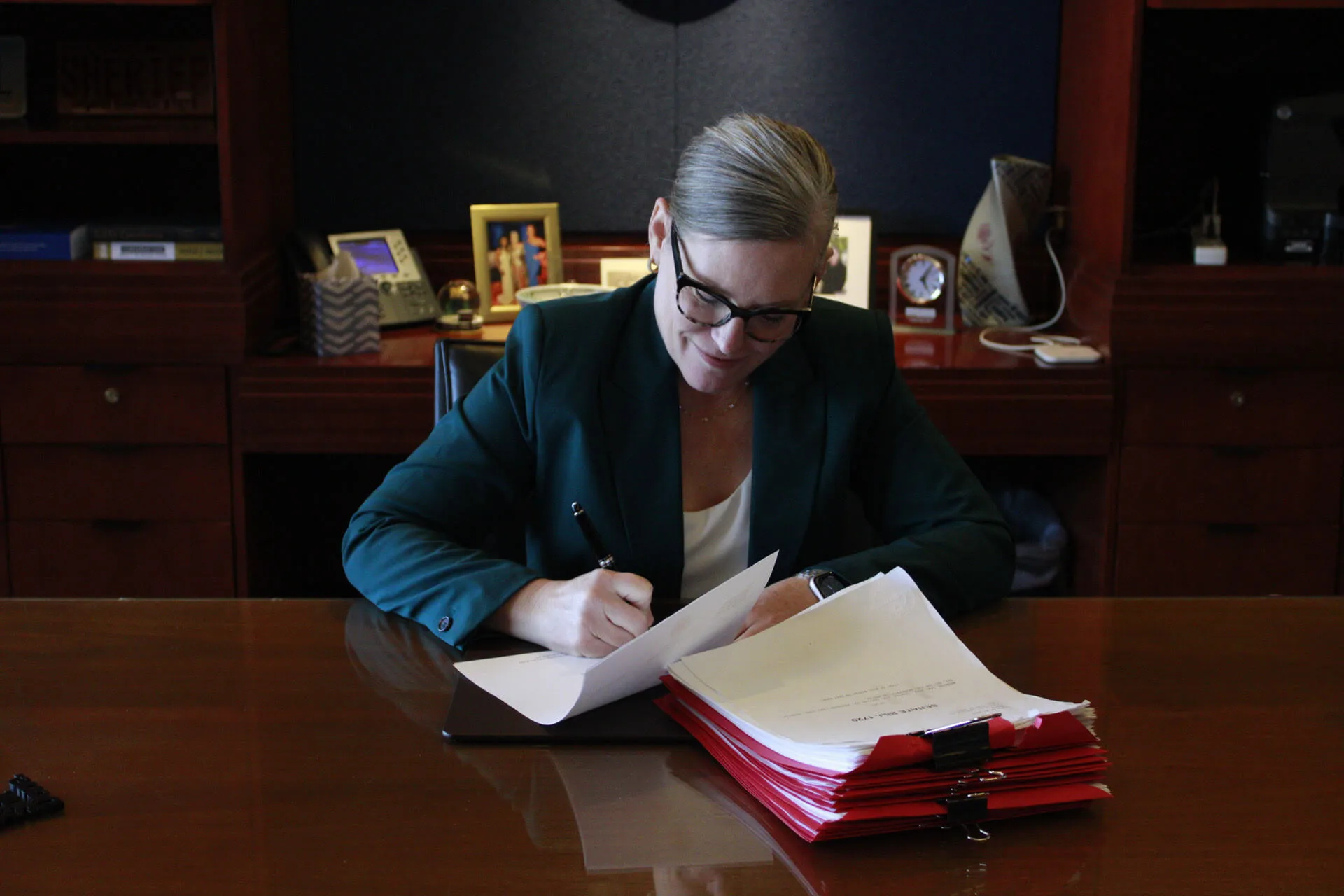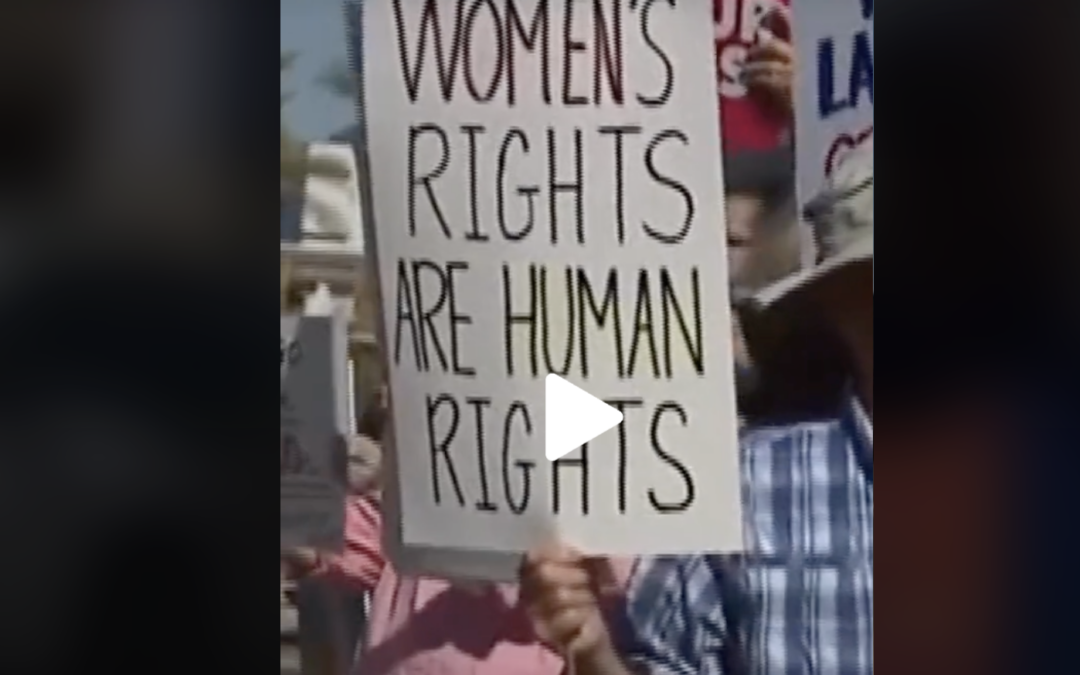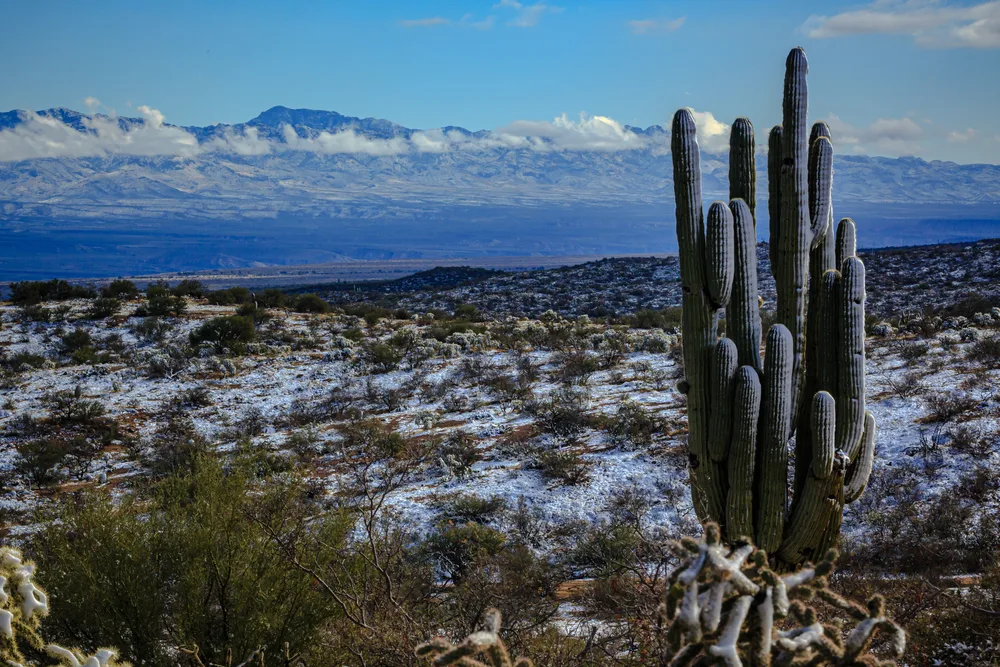
Photo courtesy Office of the Arizona Governor Katie Hobbs
Gov. Katie Hobbs on Thursday signed the largest budget in state history into law, with hundreds of millions of dollars to be invested in housing and higher education but no limit on universal school vouchers.
The proposal for Arizona’s 2023-2024 state budget was crafted by Hobbs, a Democrat, and several Republican and Democratic members of the state legislature. It was introduced Tuesday, passed the state Senate and House on Wednesday, and was signed by Hobbs on Thursday.
Many of the items outlined in the budget represent wins for Hobbs, who has made investments in affordable housing, election integrity, and efforts to curb homelessness staples of her time as governor.
RELATED: Gov. Hobbs Vetoes Personhood Bill That Would Have Further Criminalized Abortion
“We showed what happens when pragmatic leaders come together and compromise to get things done for Arizonans,” Hobbs said in a statement. “While it isn’t perfect, this budget is an important step towards making housing more affordable, building more roads, bridges and broadband access, expanding children’s health insurance, and investing in our public schools.”
But compromise comes with concessions, and some Democratic lawmakers have made their displeasure known about one of the largest trade-offs Hobbs made in return for Republican support for her budget: no limit on spending for the state’s universal school voucher program.
Here are the nine biggest budget items that could impact Arizonans’ day-to-day life.
1. Up to $750 in Tax Rebates
Parents and guardians with dependents will see a smaller tax bill. Under the new tax proposal, households with at least $1 of tax liability will:
- Receive a $250 rebate for each dependent under 17
- Receive a $100 rebate for each dependent 17 and older
The rebate is capped at $750 per household.
A tax rebate, or refund, allows taxpayers to receive reimbursement for taxes already paid, and allows those who qualify to reduce their overall tax liability. Unlike tax refunds, which are given out annually when taxes are filed, rebates can be claimed at any time.
2. Over $250 Million for Housing and Homelessness
Addressing Arizona’s growing housing crisis has been at the forefront of every level of government this year. Hobbs promised to tackle housing and homelessness during her inaugural address, pledging to allocate $150 million to the Housing Trust Fund.
A coalition of grassroots groups and advocacy organizations led by the Arizona Center for Empowerment (ACE) met with the governor in February to ask that Hobbs adopt what’s come to be known as The People’s First Economy. Part of this plan was a significant increase in funding to address the housing crisis.
“We have been steady on the housing trust fund for seven years now, so it’s a really big moment to see something that our members and communities care so much about,” Lena Avalos, policy coordinator for ACE, told The Copper Courier. “This budget is the most money that this state has seen for affordable housing in history.”
Hobbs’ budget delivered on her promise, delivering a $150 million investment in the Housing Trust Fund, $60 million for homeless shelters and services, and a series of other, smaller investments in other housing and homelessness programs.
3. $300 Million in Additional Funds for K-12 Schools
Arizona schools will receive a combined $300 million in additional funding next year, which districts will be able to use to upgrade facilities, enact pay raises, or offer bonuses to new and returning educators.
The aggregate expenditure limit, a decades-old spending limit on public education that has plagued schools for years, has also been waived for one year. Without this waiver, schools would be unable to spend the $300 million, even if it was allotted to them.
4. No Limit on Ballooning Universal School Voucher Program
Arizona’s school voucher program was expanded last year under then-Gov. Doug Ducey. Under this program, any student could utilize public funds to pay for private or charter schools without restriction last year. When it was passed, it was estimated the cost would be a little over $30 million annually.
In the first year alone, however, the program has already cost over $350 million. Without a cap on spending, there is no limit to how much the voucher program could cost taxpayers in the coming years.
Explained: How Latest School Voucher Expansion Caters to Wealthy at Students’ Expense
“I am disappointed that our budget does not include even a temporary pause on universal vouchers,” Scottsdale Democratic Rep. Laura Terech said in a public statement. “The new vouchers are threatening to bankrupt our state. They are also causing delays and issues for the original recipients.”
Hobbs had proposed a cap in her initial budget, but Republicans were quick to draw a line in the sand during negotiations. Democratic lawmakers initially voted against Hobbs’ bill as a way to protest its lack of spending limits on vouchers, but the GOP-majority legislature ultimately supported the budget.
5. $2.5 Billion for Local Spending Projects
In a unique maneuver to secure votes from lawmakers, Hobbs promised $2.5 billion that was set to go towards state projects to instead be divided between legislators, who can use the money to fund pet projects that may not have received approval as a bill or in the budget.
Democrats opted to pool their portion together—a total of $700 million—to fund statewide initiatives, including the $300 million in additional funding for schools, over $200 million to provide baby formula and prenatal doctor visits to low-income Arizonans, and the creation of an oversight committee for the universal school voucher program, among other things.
Republicans, however, divvied up their allotment among themselves: $20 million each for members of the State House, $30 million for state senators. They came up with 70 different projects in total, going towards endeavors such as rodeos, municipal infrastructure, and even the digging of a well off of State Route 30.
6. $40 Million for Infrastructure Projects and Upgrades
The plan is peppered with transportation projects ranging from $9.2 million for design costs for the West Pinal Parkway to $35.5 million for the Lake Havasu City bridge project. In all, the transportation projects add up to 50 items, on top of 44 projects approved last year.
There also are 26 local projects, such as $800,000 for sewer improvements in Snowflake to $15.3 million for capital improvements for the Prescott Frontier Days Rodeo.
7. Over $15 Million for Elections
Nearly $6 million has been set aside in the budget for the Presidential Preference Election in March 2024, which is when voters in Arizona will decide the Democratic and Republican nominees for US president, as well as nominees for potential third and fourth parties on the ballot.
RELATED: Election Deniers Upset That Nonprofits Legally Registered Arizonans To Vote
Another $5.5. Million will go towards Arizona’s Election Systems Improvement Fund—money given to the Arizona Secretary of State to administer elections—and the Citizens Clean Elections Commission. The funds come with some new oversight requirements, however, including a mandatory report from the Secretary of State to the Legislative Budget Committee before and after the Presidential Preference Election.
The state also allocated $5 million, to expand access to voting, register voters, and improve election equipment and systems.
8. $7.5 Million for Veteran, Unhoused, and Formerly Incarcerated Living Transitional Assistance
The Arizona Department of Corrections is set to receive over $600,000 to help reduce recidivism. The funding will go towards the establishment and administration of a Small Business Incubator Program to assist current and former inmates follow their entrepreneurial endeavors.
Targeted funds to address homelessness among veterans are also in place. The Homeless Veterans’ Reintegration Program will receive $5 million to assist in reintegrating homeless veterans into meaningful employment within the labor force.
Nearly $2 million is slated to go towards military transitional housing.
9. Sales Tax for Diapers, Feminine Hygiene Products Remain
While there are no tax cuts in the budget, Hobbs did push for one that was rejected by Republicans: the removal of sales tax on diapers and feminine hygiene products, which brings in about $40 million annually.
As a concession, Hobbs did manage to secure $1 million to cover the cost of adult diapers for low-income Arizonans, and another $2 million so schools could stock feminine hygiene products for students, free of charge.
Looking for the latest Arizona news? Sign up for our FREE daily newsletter.
*Editor’s Note: This article has been updated to correct a number referenced by one of the sources quoted in this story.
Politics

Trump says he’s pro-worker. His record says otherwise.
During his time on the campaign trail, Donald Trump has sought to refashion his record and image as being a pro-worker candidate—one that wants to...

VIDEO: Hundreds show up in Scottsdale to support reproductive rights
@coppercourier Days after the Arizona Supreme Court ruled to enforce a long-dormant law that bans nearly all abortions, hundreds took part in a...
Local News

US court rejects a request by tribes to block $10B energy transmission project in Arizona
In Arizona, work was halted briefly in November amid pleas by tribes to review environmental approvals for the San Pedro Valley. ALBUQUERQUE, N.M....

What to know about Trump’s legal issues
Over the past year, former president Donald Trump has become the center of not one, not two, not three, but four criminal investigations, at both...





